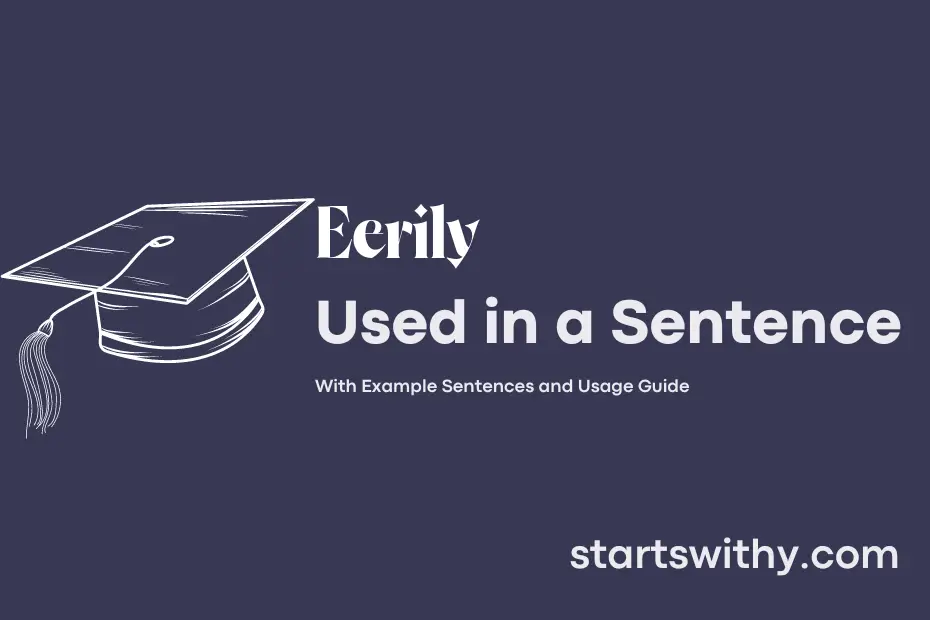Do you ever come across a sentence that just seems to give you goosebumps with its uncanny, almost supernatural quality? When a sentence creates a sense of foreboding or eerie atmosphere, it can be described as “eerily.” This specific adverb is often used to convey a feeling of strangeness or unease, setting a mysterious tone within the context of the sentence.
Whether it’s a chilling tale or a haunting description, sentences that are deemed “eerily” impactful have the power to captivate and intrigue readers with their unsettling undertones. This word adds depth and nuance to the emotion and mood of a sentence, making it a valuable tool for writers aiming to evoke a sense of the uncanny.
7 Examples Of Eerily Used In a Sentence For Kids
- The eerily quiet forest was filled with mysterious sounds.
- The eerily glowing moon shone in the dark sky.
- The eerily creaking door made the children jump.
- The eerily misty morning gave the town a spooky feel.
- The eerily flickering candle cast shadows on the wall.
- The eerily empty playground seemed abandoned.
- The eerily howling wind made the trees sway.
14 Sentences with Eerily Examples
- Eerily, the campus library felt deserted after midnight.
- Studying alone in the exam hall, I couldn’t help but feel eerily isolated.
- The abandoned classroom looked eerily similar to a scene from a horror movie.
- Eerily, the power went out during the late-night study session.
- Walking through the empty corridors late at night, I couldn’t shake the eerily quiet feeling.
- Eerily, the professor’s sudden disappearance left the class puzzled.
- The sound of footsteps echoing in the quiet hallway sent an eerily chill down my spine.
- The old lecture hall had an eerily haunted vibe that gave me goosebumps.
- As I flipped through the dusty pages of a forgotten book, an eerily relevant passage caught my eye.
- The dimly lit hostel room felt eerily surreal as I sat alone, studying for my exams.
- Eerily, a stray dog howled outside my window in the middle of the night.
- The abandoned chemistry lab looked eerily like a scene from a post-apocalyptic movie.
- The distant sound of laughter in the empty cafeteria seemed eerily out of place late at night.
- The campus grounds were eerily silent during the winter break, with most students gone for vacation.
How To Use Eerily in Sentences?
Eerily is an adverb used to describe something that is spooky or unsettling.
To use eerily in a sentence, first identify a situation that gives you an ominous feeling. For example, “The old house looked eerily silent in the moonlight.”
Next, place the word eerily before the adjective or verb that you want to emphasize as strange or unsettling. Make sure to keep the sentence structure clear to convey the sense of unease effectively.
Remember that eerily is used to create a mood or atmosphere of creepiness or mystery. It is especially useful when describing settings, sounds, or actions that give you a sense of foreboding.
Here are some example sentences using eerily:
- The abandoned amusement park was eerily quiet, with the rusted roller coaster tracks creaking in the wind.
- As she walked through the dense forest, the way the trees twisted and groaned made the atmosphere feel eerily alive.
- The eerily similar handwriting on the mysterious letter and the antique diary raised suspicions of a hidden connection.
Practice incorporating eerily into your writing to evoke a sense of unease or mystery. Experiment with different sentence structures and contexts to see how the word can enhance the atmosphere of your descriptions.
Conclusion
In conclusion, the use of the word “eerily” in sentences adds a chilling and unsettling tone by emphasizing peculiar or mysterious characteristics. When describing a scene or situation as “eerily quiet,” it creates a sense of unease by highlighting the absence of expected noise or activity. On the other hand, phrases like “eerily similar” suggest an uncanny resemblance that can provoke a feeling of discomfort or intrigue.
By employing “eerily” in sentences, writers effectively convey a sense of foreboding, unease, or fascination. This word choice evokes a specific atmosphere that grabs the reader’s attention and sets a tone that is both captivating and eerie, enhancing the narrative by adding a hint of the supernatural or otherworldly.



